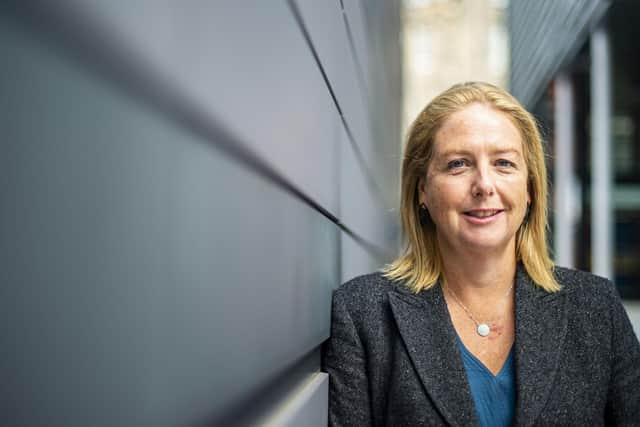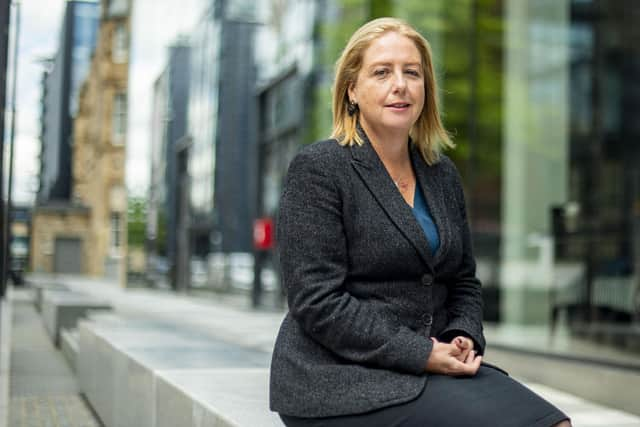The Big Interview: Rebecca Hewlett, director of renewables and environment at Xodus
The Aberdeen firm advises the likes of governments, regulators, investors and industries on energy topics from sustainability, energy mix diversification and environmental impact to new and emerging technologies, providing holistic support and insight through the integration of engineering, corporate management consultancy and environmental science.
Australian native Ms Hewlett has more than 20 years of consultancy experience, with expertise in environmental and social impact assessment, and has worked in the UK, Australia, West Africa and Papua New Guinea. During this time she has been involved in offshore renewable energy, power transmission, roads, water security and coastal defence developments.
Advertisement
Hide AdAdvertisement
Hide AdShe joined Xodus more than a decade ago, and is now is charged with moving it forward in its challenge to meet 2050 climate targets. Additionally she is a keen open water swimmer, praising the “physical and the psychological advantage of being able to focus on the underwater world” – and she has swum from Turkey to Greece and also along the upper reaches of the Thames – but now most often Gladhouse reservoir just outside Edinburgh.


Your current role at Xodus involves guiding it forwards to help meet 2050 climate targets. Can you explain more about your responsibilities – and aims? How has the firm’s work been affected by the pandemic?
I am the global director for our renewables and environment team, which currently consists of around 100 consultants and growing. Our experts are located all around the world, including the US, Australia and our new base in Japan.
We work with companies to develop new energy projects or to operate assets in the most environmentally sustainable way, which includes looking at ways of reducing carbon as well as ensuring requirements are in place for environmental and social governance.
A good example of how we work across disciplines was our involvement with the recent ScotWind leasing round. We brought our engineering, environmental, and commercial capabilities and diverse experience to assist clients with the preparation of their bids.


We’re fully integrated, both internally but also how we work with our partners. We have been able to push on with our strategic goals during the pandemic, and open offices in Boston and Tokyo. Since opening in Boston a year ago, we’ve grown to a team of ten, worked on a variety of projects and are already making a meaningful contribution to the US offshore wind industry.
During the pandemic, the world has taken a breath and looked at what's important and the carbon agenda has been elevated. In response, we have added a greenhouse gas emissions capability to our carbon management offer. We've got the opportunity to influence for meaningful change and I think the industry is ready to deliver.
I am immensely proud of my team making this such success story in the in the current climate. Given that we're all at home but working across so many time zones, the location of the offices becomes less important.
Advertisement
Hide AdAdvertisement
Hide AdIn July, Xodus said it was assessing the infrastructure and modifications required to enable electrification of Harbour Energy’s Central North Sea assets. It later launched a report urging a bolder vision to enable the UK to become a global leader in the adoption of hydrogen. Can you explain how such work forms part of Xodus’ remit and strategy?
Studies like this require an integrated multi-discipline team that understands the critical elements of offshore operations to identify the true challenges and opportunities associated with large scale electrification of existing assets. This type of study provides essential input to the North Sea industry to significantly reduce carbon emissions from offshore operations.
Likewise with the hydrogen report. We have hundreds of engineers who understand every piece of kit being used across the sector, from cables and pipelines to turbines and platforms. With ScotWind, we’re helping clients understand where the grid opportunities are and where hydrogen could play an important role.
It is no longer enough for any owner, operator or consultant to consider an energy project in isolation from other infrastructure or future supply or demand scenarios. We must be proactively pro alternatives to give potentially challenging opportunities a chance of becoming reality whereas in the past they might have been dismissed.
We aren’t taking this responsibility lightly, which is why are seen undertaking key strategic studies and doing our own research into the possibilities for the future.
You’ve highlighted how the world is still falling short of the Paris Agreement target, a recent poll of UK directors predicted that the UK will not meet its 2050 net zero target, and Greta Thunberg has said Scotland is not a “world-leader” on climate change. Can you explain what specific steps need to be carried out to speed up progress?
Speeding up progress relates directly to creating or adapting energy projects that are bankable, buildable and consentable. This means we need a three-pronged approach to accelerating towards net zero, rather than there being a single silver bullet.
Technology in renewables, particularly offshore wind, is accelerating. The announcement of a new powerful turbine by MingYang is good for the industry as it creates another serious player in the market. Floating wind is another and we’re involved in Salamander, which is a real stepping stone project for the industry.
Advertisement
Hide AdAdvertisement
Hide AdThe Scottish Government recently kicked off a new Sectoral Marine Plan round for Offshore Wind for Innovation and Targeted Oil and Gas Decarbonisation (INTOG). This will identify areas for future offshore wind development to help decarbonise the oil and gas sector through the replacement of traditional energy sources with renewable energy. The industry needs to be thinking about access to new energy systems offshore. We’re also getting much better with digitalisation, automation as well as sharing information.
There’s an education piece as well. We need to create a better and easier pathway for industry to understand what their carbon decision points are. We are now routinely providing information on carbon at the start of our working relationship so that decision-making on new projects or modifications of existing projects now have a carbon-offsetting element to them.
COP26 is taking place imminently – to what extent will this actually shift the dial regarding the climate emergency?
It’s great that it’s on our doorstep. What a fantastic platform to really create and inspire change. The clamour and attention will drive major commitments from governments across the world, and these need to quickly become policy.
But how we implement policy is where we can make the difference. We have to take the whole world with us on the same journey. The transition needs to be just. Economics, jobs, wellbeing, diversity, equity, inclusion, education, and so on, all need to be part of the story.
Shifting the dial on the climate emergency must be about embracing a vast array of possibilities; no blanket measures or one-size-fits-all approaches. Our approach in Xodus is about engaging people in the conversation, helping them find motivation in their own story, and their own opportunities to make a difference.
You are a major advocate of getting more girls into science, technology, engineering and mathematics (Stem) and encouraging women into your industry. What are you doing to help achieve this?
This is something I’m really passionate about. Xodus has a Stem programme that aims to encourage all young people, especially girls, to see opportunities available to them.
Advertisement
Hide AdAdvertisement
Hide AdIt is essential that we have a diverse range of voices to come up with the best solutions for our clients and provide a meaningful workplace environment for our colleagues.
This year, we set out clear, concise ambitions for diversity and inclusion. Our targets include 50:50, female:male graduate intake across all divisions, increasing the percentage of women to make up at least 30 per cent of our business at all levels, halving our gender pay gap, improving the ethnic diversity of our leadership team, and making it possible for project managers to work part-time.
You have a Masters in aquatic ecology – what attracted you to this field of study, and how has your career then progressed up until your current role?
Ecological communities are fascinating and provide an opportunity to analyse the systems. That’s where my desire for problem-solving originated. My focus on making a positive and material difference for the environment took me on this course.
I joined the Environment Protection Authority in Melbourne, Australia, building a predictive model using the aquatic ecosystems of all the rivers in Victoria.
That took me to the University of Edinburgh to work on food webs in Scottish streams. It was there I decided that applied science was where I wanted to spend my time, and that's when I moved across to consultancy (Babtie – now Jacobs) to specialise in environmental impact assessments.
There have been lots of different industry experiences but the overarching theme of understanding environmental impact assessment and developing effective mitigation is where my passion is.
Who do you admire in business?
I really admire Clare Wareing, the founder and chief executive of Cumulus Oncology. She's created a very successful business doing something that's of real importance to the world, while creating a place for women to thrive and progress.
Advertisement
Hide AdAdvertisement
Hide AdWhat is your best-case scenario for Xodus’ progress between now and, say, 2030 – a key climate target for the UK and EU, for example?
We aspire to be one of the key contributors to net zero. Our influence, skills and the reach we have within the industries in which we work means this really is possible.
Our vision is that together we will deliver a responsible energy future and I expect every decision we take between now and then is based on that overarching vision. Whether that means offering our floating wind expertise to a new industry in California or making step changes in methane management in the North Sea, then we should be there.
I also hope Xodus is a place where everyone can thrive, working on interesting projects that have a real impact on the future.
A message from the Editor:
Thank you for reading this article. We're more reliant on your support than ever as the shift in consumer habits brought about by coronavirus impacts our advertisers.
If you haven't already, please consider supporting our trusted, fact-checked journalism by taking out a digital subscription.
Comments
Want to join the conversation? Please or to comment on this article.
